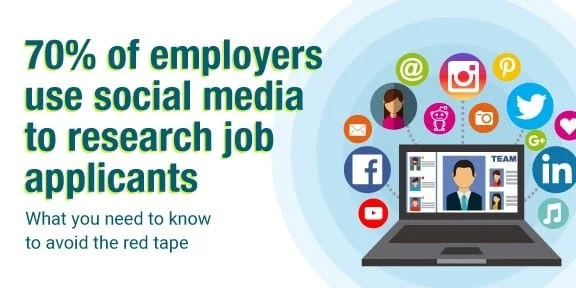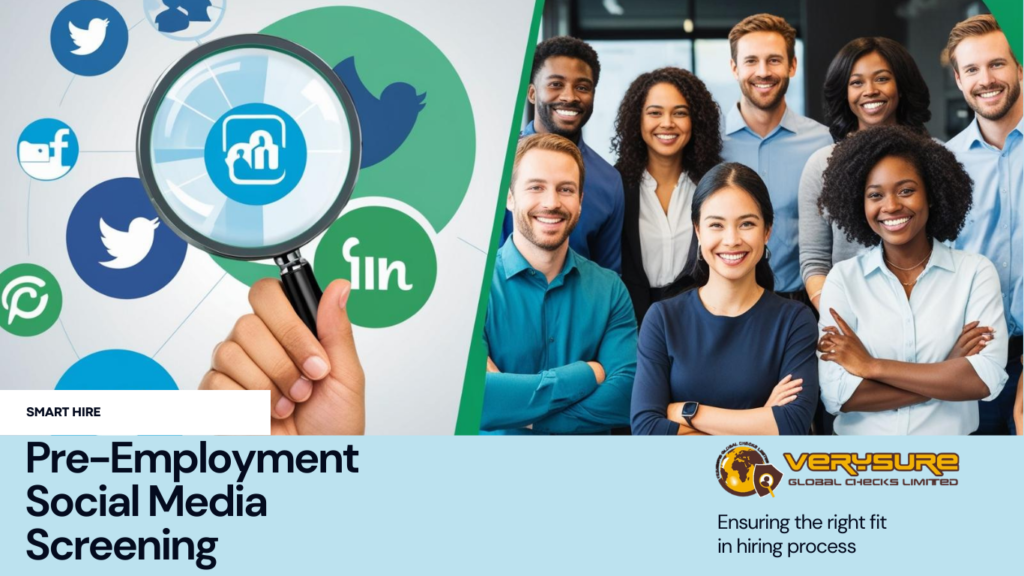In today’s world, where trust and authenticity are key, pre-employment social media screening has become an essential tool for employers. This type of background check evaluates a candidate’s online activities to assess their suitability for a role. By collecting publicly accessible data from social media platforms, employers gain valuable insights into a candidate’s character, values, and potential fit within the organization.
Why Employers Conduct Social Media Background Checks?
Employers use social media background checks to learn more about candidates as individuals, including their public conduct and any comments they have made about their professional history.
In 2024, over five billion people were using social media worldwide, a number projected to increase to over six billion by 2028. With the average person spending 143 minutes per day on social media, it has become a significant factor in hiring decisions.

Key Reasons for Social Media Background Checks
- Assessing Cultural Fit: Employers assess whether the candidate’s personal values and attitudes align with the company culture.
- Verifying Professional Qualifications: Cross-referencing information on social media profiles with the applicant’s resume or interview claims.
- Identifying Red Flags: Any signs of discriminatory language, aggression, or other concerning behavior can influence the hiring process.
- Gaining Insight into Personality: Social media can give a glimpse into how a candidate presents themselves and interacts with others online.
- Checking Communication Skills: Reviewing a candidate’s posts for clarity, tone, and professionalism.
- Evaluating Professional Networks: Employers can see who candidates interact with online, which can shed light on their industry connections and network strength.
- Ensuring the Candidate Aligns with Company Policies: Social media checks help verify that the candidate’s behavior aligns with the company’s social media and behavior policies.
- Looking for Evidence of Passion for the Role: Posts or activities related to the industry or job role may signal the candidate’s enthusiasm for the position.
- Assessing Risk for the Company: Employers gauge any potential risk, such as controversial opinions or risky behaviors, which may affect the organization.
- Verifying Candidate’s Job Search Activity: Employers can also observe if candidates are actively seeking job opportunities, which can help assess their job search habits.
Fact is that most employers (91%) are already including social media screening in their hiring process, and 54% have decided not to hire someone based on the information they discovered during the process, which underscores its growing importance in modern recruitment strategies.
By using pre-employment social media screening, employers can make more informed decisions, ensuring they find candidates who align with the company’s values and minimize hiring risks.
For further insights on the Importance of social media screening, consider exploring why this tool is essential in the recruitment process. Also, check out the difference between Pre-Hire and Post-Hire Social Media Screening to understand how social media affects job opportunities.
Benefits of Social Media Background Checks
Pre-employment social media screening plays a crucial role in providing employers with a comprehensive view of a candidate’s character and behavior online. Below are some of the key benefits of using social media background checks during recruitment:
- Simplifies the Background Check Process: Social media profiles are publicly accessible and provide valuable insights into a candidate’s personality and professional life. This reduces the time and effort spent on traditional checks.
- Provides Insights into Candidate Opportunities: Through their social media activity, employers can see if the candidate is genuinely engaged in the industry or role they are applying for, indicating enthusiasm and passion.
- Identifies Potential Red Flags: Social media profiles often reveal behaviors or comments that could be a red flag for potential employers, such as offensive language or controversial opinions.
- Assessing Cultural Fit and Protecting Brand Reputation: Social media checks help ensure that the candidate aligns with the company’s values, preserving the organization’s image and maintaining a good work environment.
- Verifies Skills and Expertise: Employers can see if a candidate has the necessary skills and experience based on their social media posts, professional interactions, and shared content.
What Shows up on a Social Media Background Check?

A social media background check includes a review of a candidate’s Facebook, X (Twitter), Instagram, TikTok, or LinkedIn profiles, where a potential employer will look at posts, comments, likes, and more. These insights can offer a glimpse into the candidate’s personal life, online behavior, and cultural fit, helping employers make more informed decisions.
When employers conduct social media background checks, they look at various aspects of a candidate’s online presence. Here’s what typically shows up:
- Criminal Activity: Evidence of illegal behavior or actions that could raise red flags.
- Work Ethic: Posts that reflect the candidate’s professionalism and approach to work.
- Employee Behavior and Values: Insights into how the candidate handles professional challenges or engages with others in the workplace.
- Cultural Fit: Whether the candidate’s values align with the company’s culture and ethos.
- Problematic Content and Privacy Issues: Posts or images that may indicate problematic behavior, including offensive or discriminatory content.
- Public Reputation: How the candidate presents themselves publicly, including online reviews or mentions.
- Personal Interests and Lifestyle: Activities and personal preferences that may reflect the candidate’s personality and life outside work.
Employers look beyond your qualifications; they analyze how you present yourself to the world. Your posts, comments, and shares can significantly influence hiring decisions. They can either highlight your professional engagement and personal achievements or raise red flags if deemed unprofessional.
What Causes a Red Flag on a Social Media Background Check?

During a social media background check, employers look for different red flags that could indicate potential risks, misalignments with company values, or behavior that may impact the work environment. Here are some key concerns that could raise a red flag:
Inappropriate or Offensive Content: Posts that include hate speech, offensive language, or inappropriate images may indicate a lack of professionalism or disrespect for others. Such content can reflect poorly on a candidate’s ability to represent the company’s brand and values.
Evidence of Illegal Activity: Social media posts revealing involvement in illegal activities such as substance abuse, criminal behavior, or dangerous actions are serious red flags. This not only indicates potential legal risks but also a lack of judgment and responsibility.
Confidentiality Breaches: Sharing sensitive information—whether it’s related to previous employers, clients, or personal matters—can show a disregard for confidentiality. This is a major concern in roles requiring trust and discretion, particularly in fields like finance, healthcare, or law.
Unprofessional Behavior: Posts that exhibit disrespect toward colleagues, former employers, or the general public can signal potential issues with teamwork and collaboration. A candidate who publicly disparages others may not fit well within the company culture.
Negative Remarks About Employers: Publicly criticizing a previous employer or co-workers on social media can indicate a lack of professionalism and emotional maturity. It may also suggest the candidate has unresolved conflicts, which could be detrimental to your team dynamic.
Inconsistent or Misleading Information: If a candidate’s social media activity contradicts the information they’ve provided on their resume or in interviews, it raises concerns about honesty and integrity. Discrepancies might suggest that the candidate is not being truthful.
Red Flags in Personal Judgments or Beliefs: Extreme political, social, or religious views shared online can be a concern, especially if they are inconsistent with the company’s values or culture. These views may cause tension in the workplace or alienate clients.
Signs of a Poor Work Ethic: Posts that highlight behaviors like excessive partying, irresponsibility, or a lack of discipline could signal issues with time management or work ethic. These habits may affect a candidate’s ability to perform effectively in a professional environment.
Lack of Digital Etiquette: A lack of respect for digital communication norms, such as trolling, excessive self-promotion, or unprofessional posts, can signal that a candidate may struggle with digital professionalism. This is especially concerning in roles where online communication is critical.
Red flags like these can serve as valuable warning signs for employers, allowing them to make more informed and confident hiring decisions. When using social media background checks, it’s crucial to balance thoroughness with fairness and respect for privacy laws.






